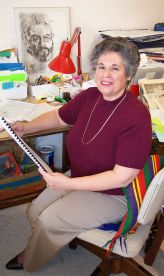
Judith Lang Zaimont is an internationally-recognized composer with an impressive catalogue of close to 100 works, many of which are prize-winning compositions. Her many composition awards include a Guggenheim Fellowship (1983-84); Maryland State Arts Council creative fellowship (1986-87); and commission grants from the National Endowment for the Arts (1982) and Minnesota Composers Forum (1993).
Her orchestral music has been repeatedly recognized through prizes and her works are frequently played in the United States (Carnegie Hall, Lincoln Center) and abroad; they are published (Galaxy/ ECS, Peters, Broude, Sounds Alive!, Vivace, Walton) and recorded (Arabesque, Leonarda, Northeastern). Her music is the subject of nine doctoral dissertations, and several of her works serve as repertoire for performance competitions. Her biography is found in most standard reference works, and she is the subject both of individual chapters in specialist volumes and major articles in professional journals.
She is also creator and editor-in-chief of the critically acclaimed book series, The Musical Woman: An International Perspective (3 vols., Greenwood Press). For this, she received a research grant from the National Endowment for the Humanities (1989), and the 1993 First Prize in the international musicology awards, the Pauline Alderman Prizes.
Formerly a member of the faculties of Queens College and Baltimore's Peabody Conservatory of Music, where she was named "Teacher of the Year" in 1985, Judith Zaimont is a distinguished teacher, and held the post of Professor of Music and Chair of the Music Department at Adelphi University from 1989-91. Since 1992 Zaimont has been Professor of Composition at the University of Minnesota School of Music where she chairs the Theory/Composition Division.
|
|
|
|
|

Monday, February 21, 2005
Music and meaning (!?)
Immensely refreshing to read Christo and Jeanne-Claude’s signal remark about ’The Gates’ (their massive new installation in Central Park) -- namely, that it is solely, simply a work of art. The artists are clear that the work contains no political resonance, it is not a comment on anything other than itself; and its reason for being is that they envisioned its existence (and in this precise space) and worked assiduously to realize their specific vision.
For me, those delicious declarations are the most radical, and most pure, aspect of the work. The declarations assert that this piece needs no ‘barnacles’ of explication, speculation nor attributions of spurious relevance. ‘The Gates’ requires no ‘program note’ nor critics’ follow-after remarks presumably working to give it heft, or meaning.
(Note too how musical an idea ‘The Gates’ is: it too is an artwork in time. It remains in existence only for a discrete period; after that point, if you want to experience it, you’ll either need to ‘perform’ it afresh [re-erect it], or catch it in reflection [via drawings, etc.] -- similar to recordings, which after all only give us one rendition of the musical work.)
And the declarations connect ‘The Gates’ with Archibald MacLeish’s key comment in his poem, “Ars Poetica”, a remark I’ve always loved: “A poem need not mean / Just be.”
The same goes for music! Every once in a while we should clean off those barnacles: shush the commentators, jettison the program notes (especially when much of what they do is rather tediously map the piece we’re about to experience) -- get out there and just listen.
If the work all on its own doesn’t make its case, then everything else is beside the point.
posted by Judith Lang Zaimont
8:13 AM
|
| |



